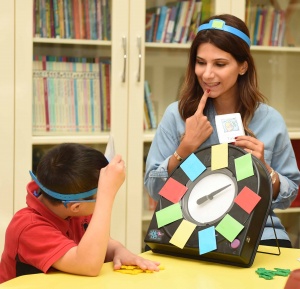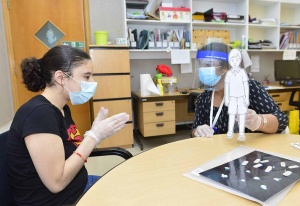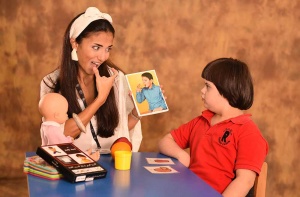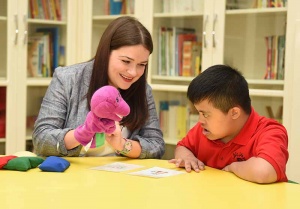Our Speech and Language Therapy department transcends school provision and aims to bridge the gap between the mainstream and the special needs community.
 Our team offers tailored assessment and therapy services, with a vision of providing a professional and individualised resource to clients in a multidisciplinary team environment.
Our team offers tailored assessment and therapy services, with a vision of providing a professional and individualised resource to clients in a multidisciplinary team environment.
We are a dedicated team of seven enthusiastic Speech and Language Therapists from around the world, combining more than 100 years of experience across various clinical areas of the profession.
We have specialists in the field of Dyslexia, early childhood intervention (EI), alternative and augmentative communication (AAC), Dysarthria, Apraxia and stuttering disorders.
 Evidence-based intervention approaches are integral to our practice; we are trained in Makaton, TalkTools, PROMPT, Lidcombe, PECS, Elklan, DIR Floortime and Attention Autism.
Evidence-based intervention approaches are integral to our practice; we are trained in Makaton, TalkTools, PROMPT, Lidcombe, PECS, Elklan, DIR Floortime and Attention Autism.
You can speak to us in English, Arabic, French, Hindi, Malayalam, Kannada, Tamil and Afrikaans.
Our services:
Students are seen on a one-to-one basis or in groups, depending on the child’s specific speech, language and communication needs. Therapy is provided at the centre and/or at client homes. The therapists also accomodate school visits where training and guidance is provided for teachers, parents, and support-staff, advocating a team-around-the-child approach .
Our main focus areas include, but are not limited to:
 Early childhood intervention
Early childhood intervention
Identifying areas of need and providing effective early support to children/toddler from birth to three years of age.
Expressive and receptive language disorders/delays
- Receptive disorders (e.g. difficulty understanding or processing language)
- Expressive disorders( e.g difficulties using language, putting words together, vocabulary limitations for sharing thoughts, ideas, and feelings, )
Augmentative – and Alternative communication
AAC (i.e., pointing, gestures, communication books and boards) is a tool that aids or fosters the development of early language skills and sets the stage for later vocabulary development and combinatorial language skills regardless of whether the child eventually talks or not.
Speech disorders/delays:
- Fluency ( e.g. stuttering)
- Speech Sound delays and disorders (e.g. articulation errors and phonological processes)
- Motor Speech Disorders (e.g. childhood apraxia of speech)
- Voice disorders related to issues with pitch, volume of voice quality to the extent that it distracts others from understanding what is being said
- Resonance in relation to hypernasality or hyponasality
 Social Communication difficulties/disorders
Social Communication difficulties/disorders
Children with social communication disorder have difficulty using language for verbal- and non-verbal communication ( e.g, greeting, commenting, asking questions, talking in different ways to suit the listener and setting, following rules for conversation and story-telling.)
Auditory processing disorders
Central auditory processing disorder affecting auditory attention, auditory discrimination and auditory memory.
Literacy
Dyslexia (e.g. a processing disorder, often characterised by difficulties in literacy acquisition affecting reading, writing and spelling, which also impacts cognitive processes such as memory, speed of processing, time management, coordination and automaticity)
Hearing Impairment
Sensorineural hearing loss, conductive hearing loss, and mixed hearing loss
Feeding- and Swallowing Disorders
Oral feeding disorders ( e.g. difficulty eating, drinking, chewing, swallowing, gagging/choking, coughing, food selectivity/refusal)

